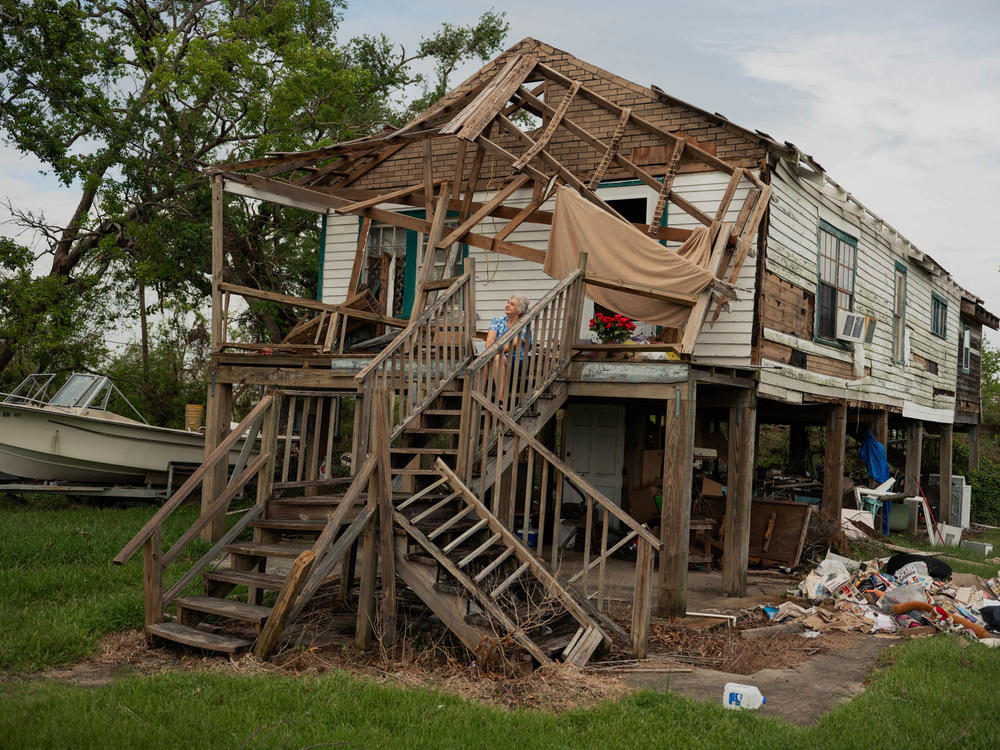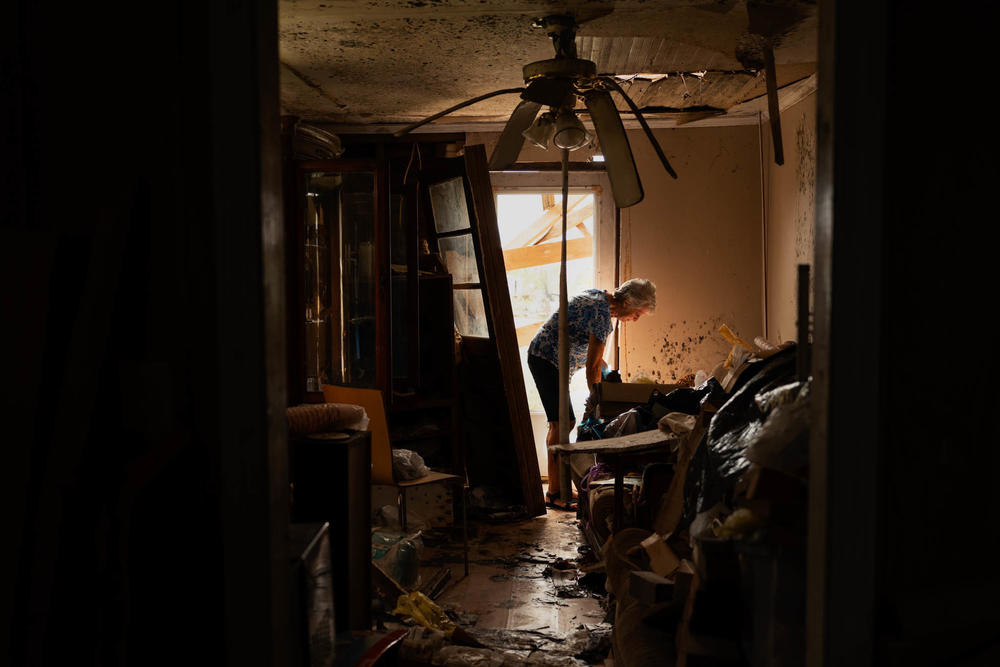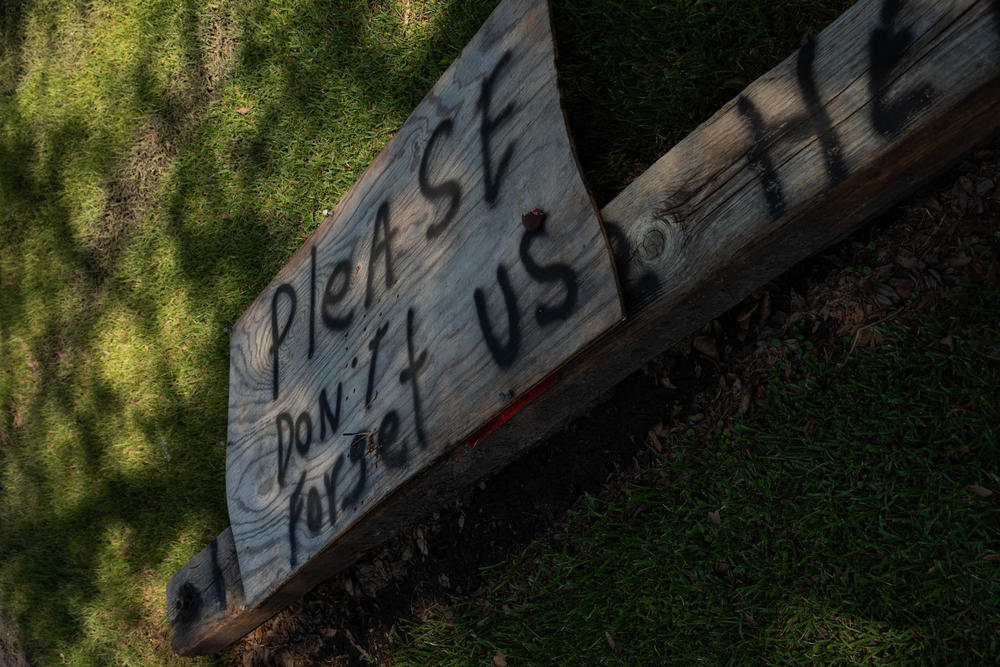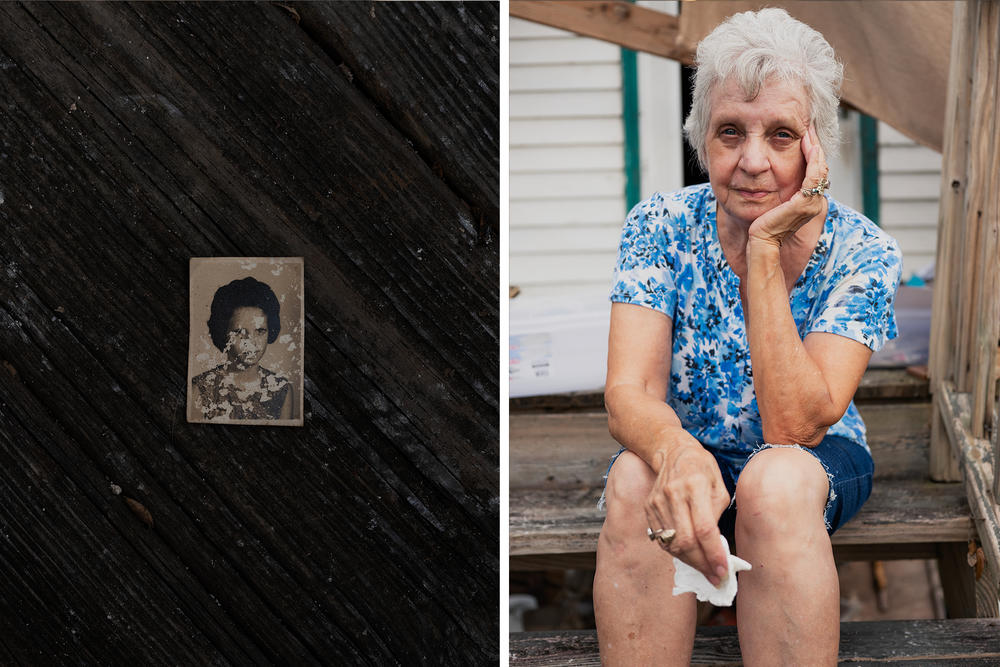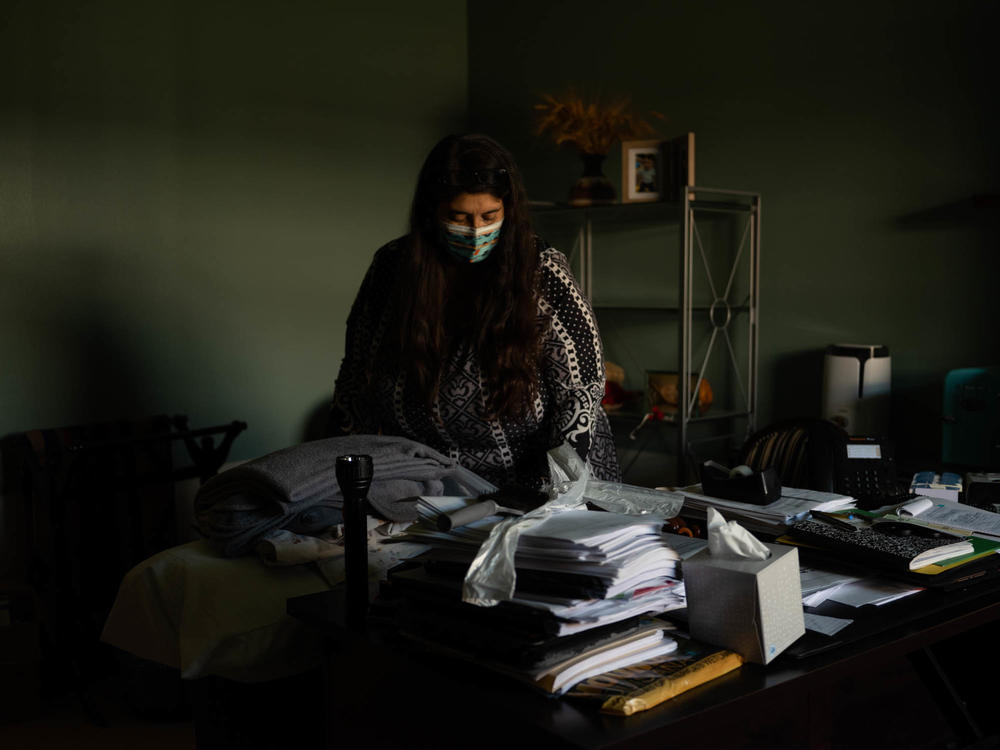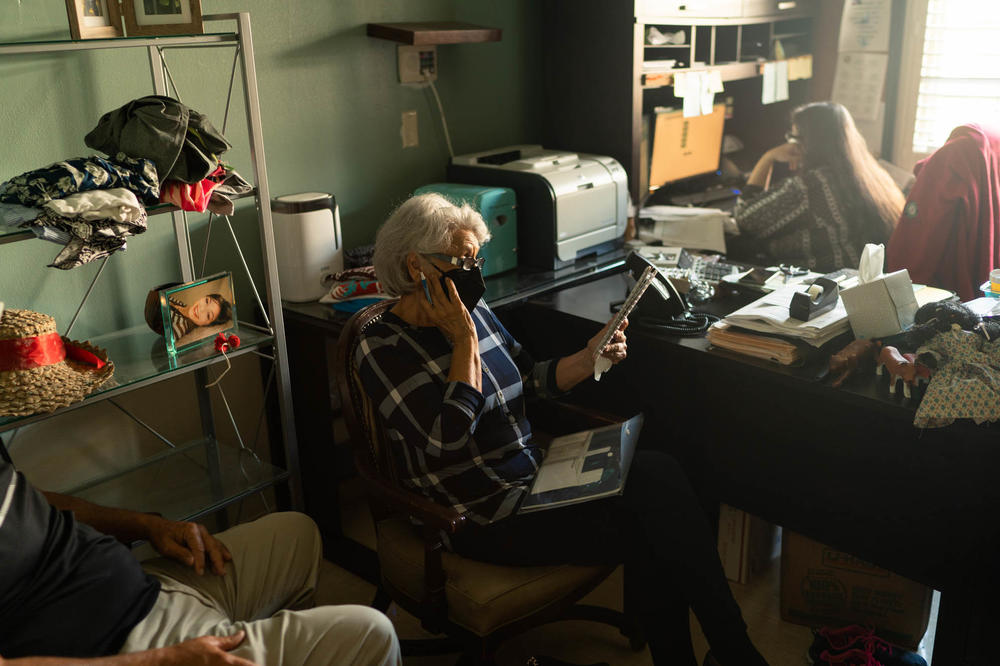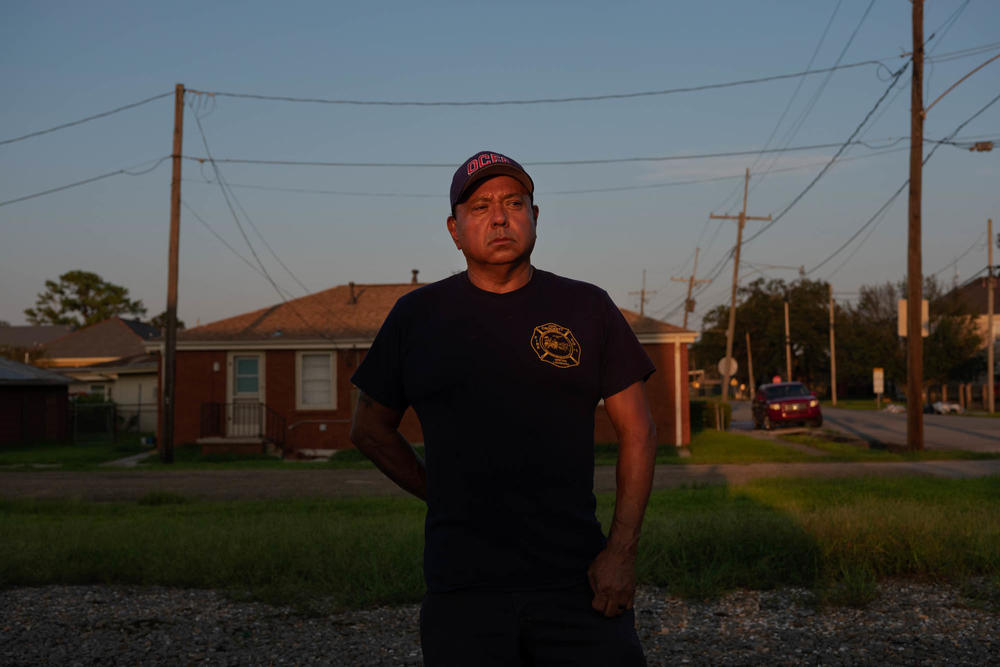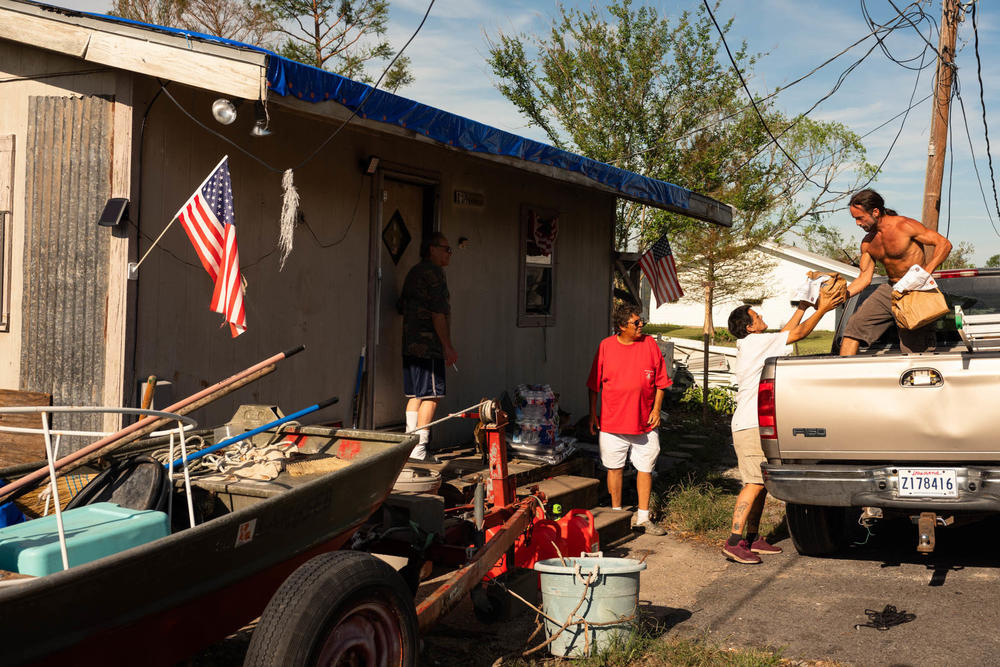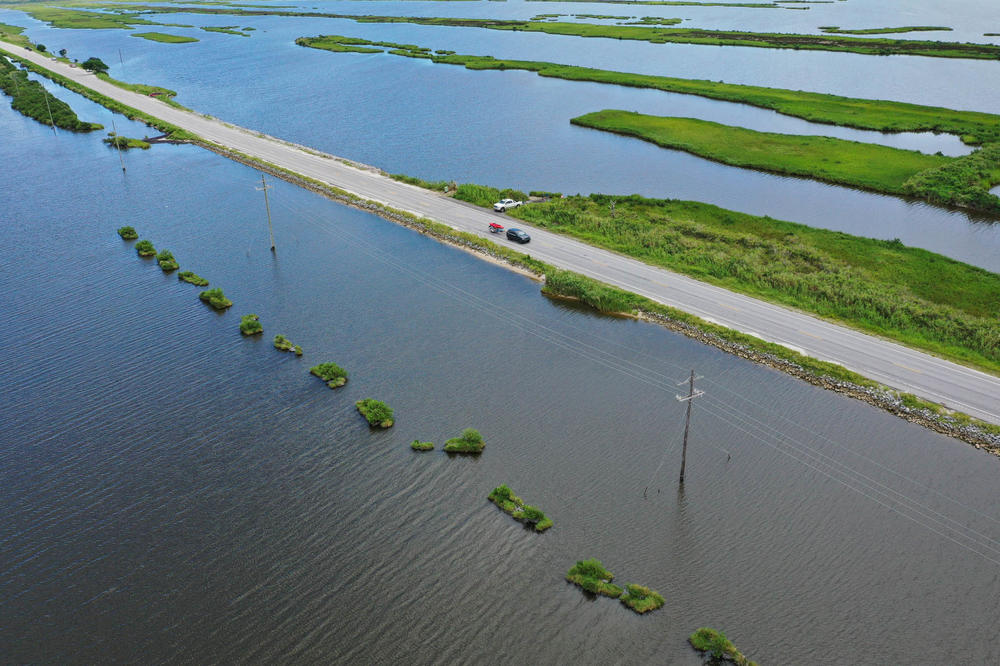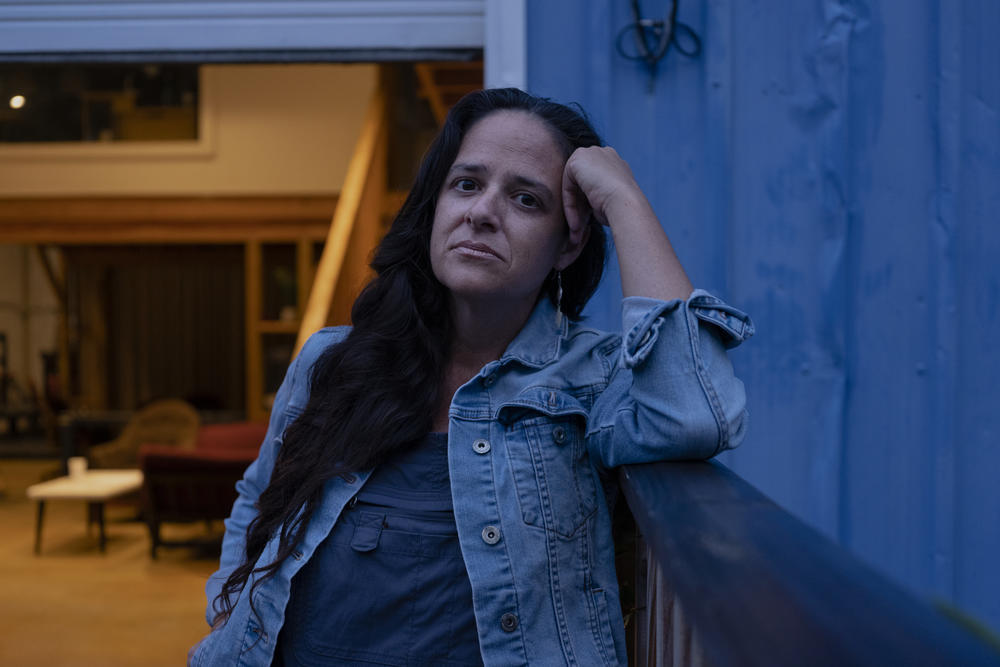Loading...
Section Branding
Header Content
Pushed to the edge, tribe members in coastal Louisiana wonder where to go after Ida
Primary Content
More than a month after Hurricane Ida, a Category 4 storm, battered Louisiana's coast, Roy and Annie Parfait still can't go home.
The Native couple, elders of the Houma tribe, are staying with family while they wait to see if federal money comes through to help them repair their roof in Dulac.
When Ida slammed the coast with winds clocked upwards of 160 mph, it devastated the fishing town located 70 miles from New Orleans. Across southeast Louisiana, gusts sliced open roofs, tore down power lines and overturned mobile homes and boats. Although the levees largely held back major flooding, entire houses blew away.
Having lived in Dulac for 70 years, the Parfaits have weathered quite a few storms in their time, including Hurricane Katrina.
"We really hadn't seen one like this," Annie said.
The housing crisis is particularly dire there. In Terrebonne Parish, where the Parfaits live, local officials estimated last week that 60% of homes in the southern part of the parish were uninhabitable.
Between Terrebonne and neighboring Lafourche Parish, about 12,000 temporary shelters are needed for those displaced, according to Kim Dodd, a spokesperson for state House Speaker Pro Tempore Tanner Magee, R-Houma. They're among the six coastal parishes that the United Houma Nation — the state's largest tribe, comprising some 19,000 members — calls home. In comparison, residents in St. John the Baptist and St. Charles — two inland parishes closer to New Orleans — need about 750 temporary homes.
The federal government doesn't recognize the Houma Nation as a tribe
The Houma people, who don't live on a traditional reservation, are spread out across these parishes along the toes of Louisiana's boot. Between oil spills, coastal erosion and catastrophic hurricanes, the bayou residents are often at the front lines of disaster.
But unlike the 574 Native American tribes currently recognized by the U.S. government, when disaster strikes, the Houma people do not receive direct federal help.
"Whenever a storm or something like this hits, the tribe just has to go through the regular channels like any other private citizen would," says Adam Crepelle , an assistant law professor at George Mason University, who is a Houma tribal member. "Whereas if it was federally recognized, it would be eligible for FEMA money and other federal programs to help with recovery."
Without that federal acknowledgement, recovery will take longer, said Houma tribal administrator Lanor Curole. Ida's devastation was so severe, she's had to look to local and state officials for help. Curole has been going from parish to parish to negotiate assistance for the communities through local offices of emergency preparedness.
The United Houma Nation is recognized by the state of Louisiana. Still, said the tribe's chief, August Creppel, "We have to wait in line with everybody else, with the state government."
The Parfaits rode out the storm with about a dozen others at the tribe's headquarters, located in Houma, La., a city named after their people, about 60 miles southwest of New Orleans. They've since had to evacuate the building, a former nursing home donated to the tribe in December, while it gets repaired from damage sustained in the storm.
For a couple of weeks, Curole had been waiting for the Terrebonne officials to deliver diesel for the center's generators. Now, she's standing by for the state to bring in cooling machines to regulate the building temperature before the mold creeps in.
Getting infrastructure back in shape could take at least two years, said Mart Black, the public information officer for the Terrebonne Parish Emergency Operations Center.
"There are buildings, thousands upon thousands of structures, that need to be repaired," he said. "We're doing everything we can do as quickly as we can."
Meanwhile, Houma staff have been both leveraging and feeding their sprawling but tight-knit network — of churches, volunteers, contractors — to coordinate shelter, roof repairs, debris removal and supply runs for tribal members.
"Ninety percent of the help we get is help that people reached out to us or we reached out to them," Chief Creppel said. The American Red Cross has also been a huge help in meeting the needs of the bayou region, tribal officials said.
"We would normally be totally self-sufficient," Curole said. "However, our normal volunteers and the folks within our community that would be stepping up and doing the work and helping with these efforts, those are the folks that are homeless right now or, you know, having to clean out homes, trying to figure out how to secure their homes."
The Houma's decades-long fight for federal recognition is ongoing
The United Houma Nation has been fighting to gain federal recognition for over 40 years.
In 1994, the Bureau of Indian Affairs rejected the tribe's petition because it did not meet the federal criteria needed to earn the formal status. The United Houma Nation failed to prove that it was a unified community, that it had a modern political body or that it had descended from a tribe named Houma, the bureau said at the time.
"The government's position was basically, in a nutshell, that you are Indigenous, but you can't prove what tribe you came from," said Mark Miller, a history professor at Southern Utah University history and author of the book Forgotten Tribes.
As early as 1682, French writings place the tribe on the Mississippi River, just north of present-day Baton Rouge, according to Miller. In the late 1700s through the 1800s, European and American settlements eventually drove the Houma south to settle in the coastal region.
"A lot of these people did have [Houma] heritage," Miller said. But, because of intertribal marriage, warfare and diseases, he said, it wouldn't be surprising if the original Houma tribe splintered into a mix of various ancestral ties.
Where the U.S. government saw a gap in the historical paper trail, tribal administrator Curole said the Houma see a flawed process that can't shake Western conceptions of Native communities.
"We are being held to the standard of European documentation — you're hoping some Europeans think you're important enough to write about," she said.
The Houma come from an oral tradition, she said, and, although they have been spread out along the bayous for decades, a network of canals made for easy transportation.
Criticism over the tribal recognition criteria pressured the Obama administration to reform the bureau's approval process. The removal of a key barrier could help: Now, all tribes must prove their existence and cohesion starting only in 1900. The United Houma Nation's bid for recognition is stalled until it revises its petition to the Bureau of Indian Affairs based on the new rules, the bureau told NPR in an email.
Miller said the new guidelines haven't dropped a critical sticking point: Tribes still must prove that they descend from a tribe whose existence is chronicled in analog documents dating 1900 or earlier. "That's going to be kind of a burden," he said. "Historical documents on non-white people are very difficult to find."
Curole said that the tribal community's immediate needs have taken priority over returning to the research-intensive and time-consuming federal recognition effort.
If the tribe's petition is rejected, it cannot re-petition, according to the Bureau of Indian Affairs.
"Federal recognition puts us on a different playing level and brings in funds and education for our kids. It brings in health programs for our elders," Chief Creppel said. "This is a very big fight for me. Not so much for me, because I know who I am and people know who we are. But it's so much for my elders, what they went through — for them to be recognized."
Federal recognition status could protect Houma land
The lack of federal recognition may have already had catastrophic consequences for the tribe.
After the 2010 Gulf oil spill polluted tribal fishing waters — a livelihood for many Native tribes in the bayous — members of the Houma Nation said they failed to find a legal path that would allow them to get compensation to help recover from a disaster that harmed wildlife and residents' physical health.
The United Houma Nation reached out to BP — the oil company found responsible for the massive leak — for assistance, Thomas Dardar, who was the tribe's principal chief at the time, said in a 2012 congressional hearing. But because the Houma aren't federally recognized, Dardar said, BP told them that it wasn't mandated to help the tribe. BP has not responded to NPR's request for comment.
In the first month after Ida, the National Oceanic and Atmospheric Administration logged 70 reports of oil spills in the Gulf region. In a normal month, according to The New York Times, the agency spots about 25 spills nationwide.
At the same time, coastal erosion is washing away the land — a problem accelerated by oil spills — threatening to take Houma's culture with it.
"Where we used to walk at, now we fish," said Dardar, who is now the Houma Nation's hurricane relief coordinator. "And that's been in my lifetime I've seen that happen."
If the Native tribes in the region were federally recognized, said law professor Crepelle, they could implement their own environmental regulations and protections. But the likelihood of earning that status is a catch-22 when keeping the community close to its home means staying in the danger zone.
"People get dispersed through the storms," Crepelle said. "When that happens, it's going to be harder to prove community because everybody's spread out and they're not likely to return always."
With disaster ever-present, some Houma Natives wonder where they will go next
Such threats to the community are on the mind of Monique Verdin. Ahead of Ida's landfall, the 41-year-old Houma member and filmmaker evacuated to Florida. She returned home to St. Bernard Parish after the storm passed to help with relief efforts.
The day she arrived back in her home state, she said, she signed on a month-old offer to own a patch of land on higher ground, just north of Lafayette, La.
"I personally need a safe place to run to, but for my family too," Verdin said.
She worries about what potential displacements from disasters could mean for her community's adaptation. She's thinking about the vanishing gravesites of her ancestors. She's thinking about the younger generations who she says need well-funded public schools in the area, or who want to leave to pursue a livelihood outside of the environmentally beleaguered fishing and oil industries.
"You can't run from climate change," she said. "My fear is that people will be scattered to the winds."
"Maybe we figure out a retreat and return. Maybe some will evacuate."
Looking into the future, there's at least one thing about the Houma tribe that doesn't give her concern.
"People really show up in times of disaster," she said.
Hafsa Fathima, Lulu Garcia-Navarro and Michele Abercrombie contributed to this report.
Copyright 2021 NPR. To see more, visit https://www.npr.org.
